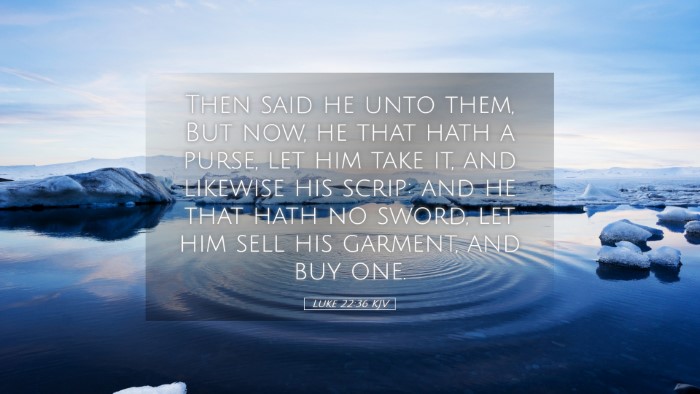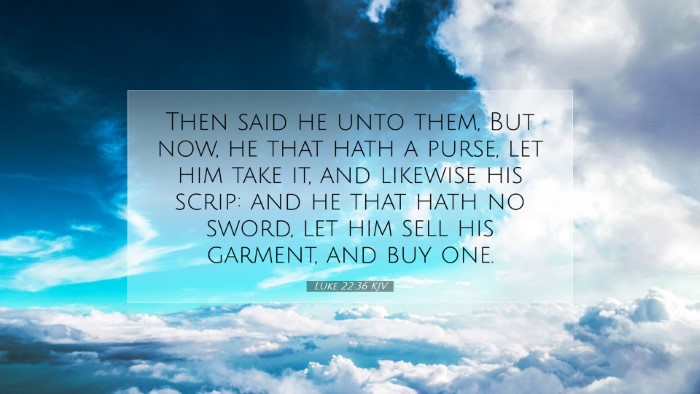Commentary on Luke 22:36
Verse Reference: Luke 22:36 (KJV) - "Then said he unto them, But now, he that hath a purse, let him take it, and likewise his scrip: and he that hath no sword, let him sell his garment, and buy one."
Introduction
This verse is a significant moment in the context of Jesus' final hours before His crucifixion. It encapsulates a shift in the mission strategy of Jesus and reflects the larger theological themes of preparedness and self-defense amidst impending peril. As we explore this verse, we will synthesize insights from notable public domain commentaries to enhance our understanding.
Analysis of the Verse
Luke 22:36 illustrates a pivotal transition and the practical implications of discipleship in the face of adversity. Jesus directs His disciples to prepare themselves for the trials that will soon come. Here’s a deeper look into the components of the verse:
1. The Call for Preparedness
- Commentary Insight: According to Matthew Henry, this admonition reflects the need for the disciples to be vigilant and prepared for the coming hostility. The directive to carry a purse and scrip signifies prudence in the use of resources and the need to be equipped for the future.
- Spiritual Readiness: Albert Barnes highlights that this preparedness is not merely physical but also spiritual. The metaphorical meaning is that believers must be ready for spiritual battles, armed with faith and the Word of God.
- Physical Provisions: Adam Clarke suggests that the literal instruction to have a purse and scrip points to the practical realities of life, emphasizing that God's people should not deny the challenges that lay ahead, including financial hardship.
2. The Reference to Swords
Jesus' instruction to sell garments to buy a sword has been interpreted variously across commentaries:
- Literal Interpretation: Matthew Henry interprets the urgency of the command as Jesus acknowledging that the time for peaceful ministry is over and that a period of conflict is about to begin, thus rationalizing the need for swords as instruments of defense.
- Metaphorical Insight: Conversely, Albert Barnes asserts that the sword symbolizes the spiritual weapon of faith. This aligns with Ephesians 6:17, where Paul refers to the "sword of the Spirit" as essential for spiritual warfare.
- Contextual Understanding: Adam Clarke provides a nuanced view, positing that the sword symbolizes the realization that the disciples must be aware of the realities of this world, recognizing that they will face opposition from a hostile culture.
3. Implications of Self-Defense
The mention of buying a sword has sparked extensive debate regarding the implications of self-defense in Christian ethics. Here, a few perspectives emerge:
- Ethical Reflections: Matthew Henry advises caution against using this verse as a justification for violence, asserting that Jesus’ model is one of peace, yet this moment illustrates the complexities of self-preservation in dire situations.
- Historical Context: Albert Barnes suggests understanding this directive within the historical context of the Roman occupation and the disciples’ circumstances – not as an encouragement for armed conflict but rather as a recognition of their precarious position.
- The Role of Authority: Adam Clarke contextualizes that, throughout history, God’s people have faced persecution, emphasizing that wisdom in navigating such trials does not equate to promoting violence but rather signifies the importance of discernment in faith.
Theological Themes
This verse opens a dialogue on several theological themes relevant to pastors, students, and scholars:
1. Preparedness and Responsibility
The call for the disciples to prepare reflects a timeless principle in spiritual life: the balance of faith and practical preparation. Matthew Henry astutely argues that faith does not negate wisdom; rather, preparedness is a demonstration of faith in action.
2. The Nature of Discipleship
Discipleship is portrayed not only as a spiritual journey but also as one that demands awareness of the surrounding challenges. Albert Barnes notes that true discipleship encompasses a willingness to face trials while remaining steadfast in our mission.
3. Understanding Suffering
The recognition of the impending suffering in Jesus' life reinforces the reality of struggle within the Christian faith. Adam Clarke emphasizes the importance of understanding suffering as a necessary component of a life devoted to Christ, echoing the teachings of James regarding joy in trials.
Conclusion
Luke 22:36 serves as a multifaceted verse that invites in-depth reflection on themes of preparedness, ethical implications of self-defense, and the nature of discipleship amidst persecution. By synthesizing the insights of Matthew Henry, Albert Barnes, and Adam Clarke, we gain a more comprehensive understanding of this profound teaching of Jesus. In today’s context, it challenges believers to balance faith with wisdom, to remain alert in their spiritual journeys, and to prepare for the challenges that lie ahead in their walk with Christ.


